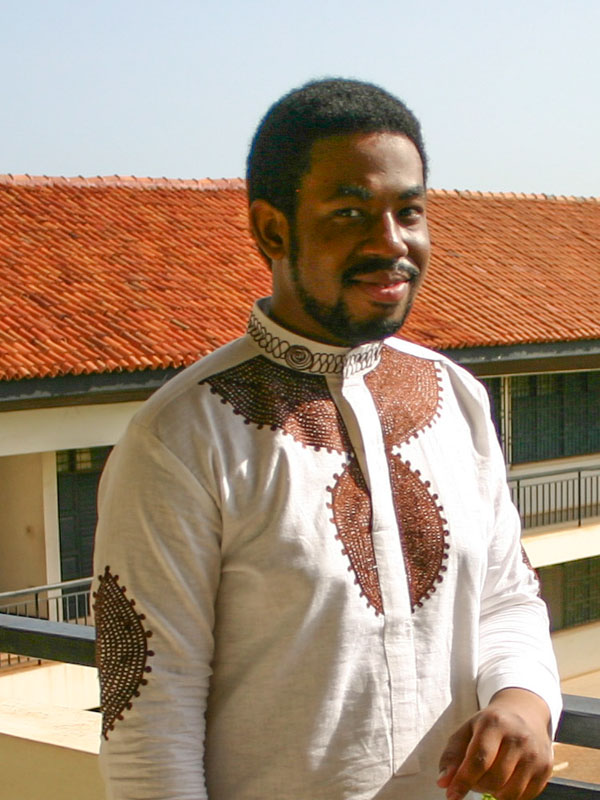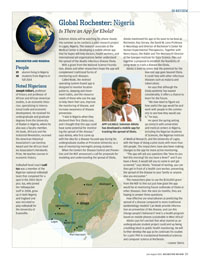In Review
 APP-LICABLE: Solomon Abiola has developed a mobile app for tracking the spread of Ebola. (Photo: Courtesy of the subject)
APP-LICABLE: Solomon Abiola has developed a mobile app for tracking the spread of Ebola. (Photo: Courtesy of the subject)Solomon Abiola will be watching his phone closely this summer as he conducts a pilot research project in Lagos, Nigeria. The research associate at the Medical Center is developing a mobile phone app that he hopes will help doctors, health workers, and international aid organizations better understand the spread of the deadly infectious disease Ebola.
Rochester and Nigeria
People
19 alumni living in Nigeria
18 students from Nigeria in fall 2014
Noted Nigerians
Joseph Inikori, professor of history and professor of African and African-American studies, is an economic historian, specializing in international trade and economic development. He received his undergraduate and graduate degrees from the University of Ibadan in Nigeria, where he also was a faculty member. His book, Africans and the Industrial Revolution, received the American Historical Association’s Leo Gershoy Award and the African Studies Association’s Herskovits Prize. He teaches courses in economic history.
Volleyball head coach Ladi Iya was a member of the Nigerian national volleyball team that competed for a spot in the 2004 Olympics. Iya, who joined the Yellowjacket staff in 2008, grew up in both Nigeria and England and was recruited to play volleyball for the University of Evansville.
With a grant from the National Science Foundation, Abiola and other researchers hope the app will complement traditional forms of monitoring such diseases.
Called Node, the Android operating system–based app is designed to monitor location patterns, sleeping and movement habits, and the resource needs of those who use the app to help them find care, improve the monitoring of disease, and increase awareness of disease prevention.
“I was in Nigeria when they declared their first Ebola case, and I thought that this app could have some potential for monitoring the spread of the disease,” says Abiola, who first came up with the idea for a disease-focused app during his undergraduate studies at Princeton University as a way of monitoring meningitis among students.
When the Centers for Disease Control and Prevention and the NSF announced a call for proposals for modeling and understanding the spread of Ebola, Abiola mentioned his app to his soon-to-be boss at Rochester, Ray Dorsey, the David M. Levy Professor in Neurology and director of Rochester’s Center for Human Experimental Therapeutics. Together with Henry Kautz, the Robin and Tim Wentworth Director of the Goergen Institute for Data Science, they put together a proposal to establish the feasibility of using Node to track a disease like Ebola.
Abiola is keen to stress that the potential for the low-cost app goes beyond Ebola. It could help with other infectious diseases such as malaria and tuberculosis.
He says that although the Ebola epidemic has waned considerably, it offers a chance to learn for the future.
“We now need to figure out how useful the app would be and work with people in the community to see how they would use it,” he says.
He spent the spring setting up contacts with universities and medical centers in Nigeria, including the Nigerian Academy of Sciences, the Nigerian Institute of Medical Research, and the University of Lagos, with the hope of doing a pilot study with more than 100 people. The researchers have also been making changes to the app for more active monitoring.
“The app will ask you questions like ‘How do you feel this morning? Do you have a fever?’ and if you have a fever, it would tell you to come in and get screened,” says Abiola. “Instead of waiting, you can then get in front of a health care worker, preventing the spread of the disease to your family or anyone else you encounter.”
The researchers plan to use the $130,000 grant from the NSF to find out just how good the app would be at monitoring future outbreaks of Ebola or other diseases. Over the next six months, they are hoping to answer three questions:
How effective are smartphones at predicting the spread of a disease compared to more traditional epidemiology models? Can Node provide information on prevention of the disease, and can this change people’s behaviors? And is a health program based on mobile phones sustainable in West Africa?
Abiola says he’s excited that what started as an undergraduate student project could end up being a building block in public health monitoring. He will further develop the app as he continues his studies for a joint PhD in translational biomedical sciences and computer science at Rochester.
—Leonor Sierra

